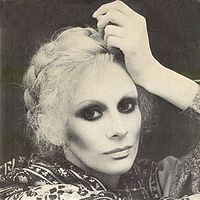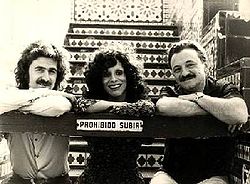- Nacha Guevara
-
Nacha Guevara 
Nacha Guevara, 1974Background information Birth name Clotilde Acosta Born 3 October 1940
Mar de Plata, Buenos Aires
ArgentinaOccupations Musician, songwriter, actress Instruments Vocalist Nacha Guevara (born Clotilde Acosta, October 3, 1940) is an Argentine singer and actress from Mar de Plata, Buenos Aires, Argentina.
Trained as a dancer and actress, she discovered by chance a career as a singer becoming a symbol in the song of protest movement around 1968 in the avant-garde Instituto Di Tella in Buenos Aires, the preeminent pioneer center for visual and theater experimentation at that time. She was a controversial cult figure in the underground movement and as a singer-songwriter in the "cafe-concert" scene, singing tunes and parodies by Boris Vian, George Brassens, Tom Lehrer, Nicolas Guillén and argentinian writers like Julio Cortázar, Jorge de la Vega, Ernesto Schoo and others.
At the beginning of 1970, one of her pivotal works was "Nacha sings Benedetti", where she and Alberto Favero, musical partner and at that time husband, wrote some of the most famous poems of Uruguayan poet Mario Benedetti to music.
In 1973 she obtained ample recognition by critics and audiences with a big revue named Las mil y una Nachas (One thousand and one Nachas). Nacha Guevara exiled herself first to Peru then Mexico during the Dirty War, threatened by the Triple A death squad. She attempted to make a comeback in 1976 with a new version of "Las mil y una Nachas". The show was never performed. After the dress rehearsal prior to the opening night, a bomb destroyed the theater, killing members of the crew and forcing her to flee the country once more.
She continued a successful career in Mexico, Cuba and Spain with performances in New York, Chicago and La Habana too, before returning to Argentina.
Nacha Guevara has acted in numerous Argentine films, as well as on Broadway. However, she is best known for her extensive musical career, which has been realized throughout the world and over several decades.
After the end of the Argentinian dictatorship, she came back to her native country in 1984. In 1986 she starred Pedro Orgambide's Eva, an Argentinean answer to the musical Evita by Andrew Lloyd Webber. The show was redone for a bigger version in 2008 and renamed Eva, the great Argentinean musical.
In the last decades she won recognition as an actress, participating in movies and TV shows such as "Alas, Poder y Pasión" (Wings, Power and Passion) and films as "El Lado Oscuro del Corazón" (The Dark Side of the Heart) and its sequel, where she plays Death, a symbolic character who is in love with the hero and harasses him, trying to take him to the other side.
Ahead of the June 2009 legislative elections, Guevara has supported the ruling Front for Victory faction of President Cristina Fernández de Kirchner as a National Deputy for Buenos Aires Province, on the list headed by former President Néstor Kirchner.[1]
External links
References
- ^ Nacha Guevara, arropada en su rol de candidata, se alineó al discurso de Kirchner, Clarín, 29 April 2009. Accessed 6 May 2009.
Categories:- 1940 births
- Living people
- Argentine actors
- Argentine female singers
- Argentine film actors
- Argentine musicians
- Argentine singer-songwriters
- People from Mar del Plata
Wikimedia Foundation. 2010.

